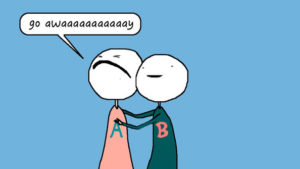
I need more space
It’s been a while since I updated my blog. Just to let you know, I have not been slacking. Most of my work is done at schools, so summer is typically a time for other projects. I’m working on a YA novel. It’s going slowly, thank you, and I appreciate having this time to make progress. That said, I got an email from a tween this morning and thought it might help you and your daughter, because we all know that girl friendship drama rarely takes a summer vacation.
Tween: I’ve known Friend A for 4 years. I have another friend who I’m now closer to. Friend A just wants me to be with her alone. I have tried to include her with my other friend, or any of my friends but she never wants to do what we’re doing. She tries to squeeze in between me and whoever I’m sitting or standing next to. She over-compliments me for everything and it makes me embarrassed. She’s always hugging me and trying to hook arms with me. It bothers me a lot and it seems to get worse every day. I don’t want to be mean to her but I’m really getting so annoyed! – Strangled
Annie: I understand your challenge. Friendships change. Sounds like this one has. Friend A likes you very much. That’s a good thing. She’s used to having you as her best and only friend. She may be clingy because she’s afraid she’ll lose the friendship. For some people, change can be a scary thing. You can understand that, can’t you?
Friend A may not feel confident in herself and she may worry that others won’t want to be her friend. That’s kinda sad. But it is not your problem if she feels uncertain about her ability to make new friends. That’s something she has to figure out for herself. She can and she will!
Let’s talk about what you can do to make this situation better.
You are a kind-hearted person. That’s a very good thing! But it’s also a very good thing to set boundaries for your friends and let them know what you want and need in the friendship. Have you ever told Friend A that her compliments and hugs upset you? If you haven’t, how is she supposed to know?
You have the right to spend time with people who want to spend time with you. You also have the right to demand more space than this girl is giving you.
What are your options here?
a) Stay silent, keep smiling, and pretend this doesn’t bother you.
b) Tell her you don’t want to be her friend any more and that she’d better just stay away from you
c) Stop talking to her altogether (Give her the silent treatment.)
d) Have a private conversation with her. Tell her that she is your friend and you also like to spend time with other friends.
e) Tell her you’ve noticed how upset she gets when you are with other people. Give her an example of something she does that upsets you. Ask for her ideas of how you two can stay friends and have more fun and less stress.
Which of these options sound helpful? (There might be more than one.) Which ones would not be helpful to you, the girl, or the friendship?
Think about it.
In friendship,
Annie












